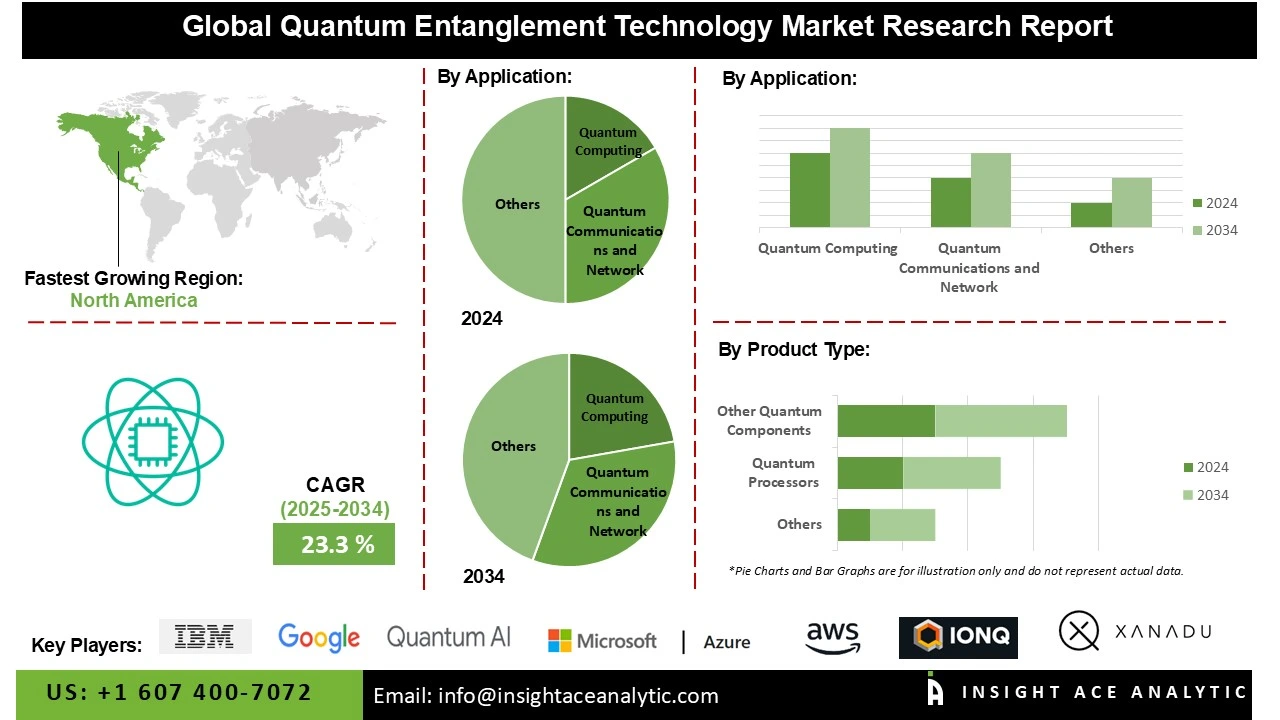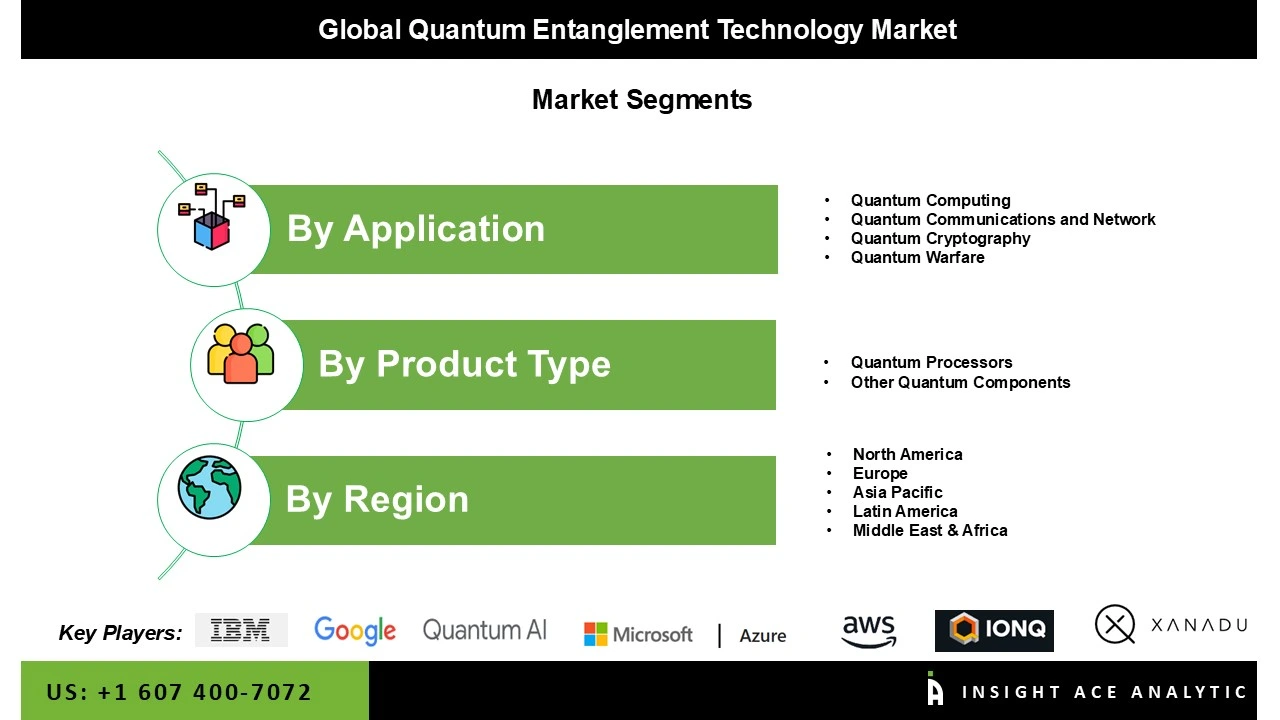Global Quantum Entanglement Technology Market Size is predicted grow at an 23.3% CAGR during the forecast period for 2025-2034.
Quantum entanglement technology harnesses the phenomenon in which two or more particles become fundamentally linked, such that the state of one instantly influences the other even across vast distances. This unique property enables ultra-secure communication, high-precision sensing, and next-generation quantum computing. By exploiting entangled photons, ions, or atoms, researchers can achieve cryptographic channels resistant to interception, enhance measurement accuracy beyond classical limits, and accelerate computational tasks. As global investments grow, entanglement is transforming fields such as cybersecurity, national defense, space communication, and advanced materials research, positioning it as a foundational pillar of the emerging quantum technology ecosystem.

The quantum entanglement technology industry is seeing robust growth fueled by rising developments in quantum computing, secure communication, and high-precision sensing. One of the key drivers is growing demand for ultra-secure data transmission across finance, defense, and healthcare, with quantum entanglement enabling unhackable communication channels. Moreover, governmental action and private investment in quantum research are pushing technology development, with partnerships between universities and tech industries supporting innovation. The market is further fueled by growing R&D investment in creating scalable, error-resistant quantum systems and entanglement-based devices. Continuous improvements in quantum hardware, such as superconducting qubits and photonic systems, are expanding practical applications, making quantum entanglement a cornerstone for next-generation computing and communication technologies.
Some of the Key Players in the Quantum Entanglement Technology Market:
· IBM
· Google (Quantum AI)
· Microsoft (Azure Quantum)
· Amazon Web Services (AWS) – Amazon Braket
· IonQ
· D-Wave Systems
· Quantinuum
· Xanadu
· Qunnect
· Aliro Quantum
· Others
The quantum entanglement technology market is segmented product, and application. By product, the market is segmented into, quantum processors, and other quantum components. By application, the market is segmented into quantum computing, quantum communications & network, quantum cryptography, and quantum warfare.
In 2024, the quantum processors segment held the major market share due to the increasing demand for quantum processors that leverage entanglement to perform complex computations exponentially faster than classical systems. Rising applications in cryptography, optimization, and simulation across finance, healthcare, and defense fuel this need. Additionally, increasing investments from governments and tech firms in quantum research, along with the push for scalable and error-resistant quantum processors, are fueling the development and adoption of entanglement-based quantum technologies globally.
The quantum entanglement technology market is dominated by quantum cryptography due to the increasing demand for ultra-secure communications systems. Quantum entanglement allows for immediate, tamper-proof data transmission, which is best suited for keeping sensitive information secure in industries such as finance, defense, and government. Increased cyber-attacks and growing fears regarding data breaches are the primary drivers for the use of quantum cryptography solutions. Moreover, research and development in quantum hardware and algorithms and governmental efforts and funding are propelling the development and deployment of entanglement-based secure networks across the world, including North America and Europe.
Regionally, North America Led the Quantum Entanglement Technology Market
North America dominates the market for quantum entanglement technology due to region’s increasing investments in quantum computing and secure communication systems. A primary driver is the rising demand for ultra-secure data transmission in sectors like defense, finance, and healthcare, where traditional encryption is insufficient. North American governments and private enterprises are heavily funding research to leverage entanglement for quantum key distribution and advanced computing. Additionally, technological advancements in photon-based systems and quantum networks, combined with collaborations between tech companies and research institutions, are accelerating adoption across the region.
Moreover, Europe's quantum entanglement technology market is also fueled due to growing demand for ultra-secure communication and next-generation computing solutions. Quantum entanglement enables instant data transfer and larger encryption, making it essential for industries such as defense, finance, and telecommunications. Rising investments by European governments and private companies in quantum research, combined with the effort for quantum-based secure networks, are boosting adoption. In addition, the proliferation of quantum computing projects throughout Europe, which work toward solving challenging computational issues faster and in a more efficient manner, further drives the market's growth.
Quantum Entanglement Technology Market by Application
· Quantum Computing
· Quantum Communications & Network
· Quantum Cryptography
· Quantum Warfare

Quantum Entanglement Technology Market by Product
· Quantum Processors
· Other Quantum Components
Quantum Entanglement Technology Market by Region
North America-
· The US
· Canada
Europe-
· Germany
· The UK
· France
· Italy
· Spain
· Rest of Europe
Asia-Pacific-
· China
· Japan
· India
· South Korea
· Southeast Asia
· Rest of Asia Pacific
Latin America-
· Brazil
· Argentina
· Mexico
· Rest of Latin America
Middle East & Africa-
· GCC Countries
· South Africa
· Rest of the Middle East and Africa
This study employed a multi-step, mixed-method research approach that integrates:
This approach ensures a balanced and validated understanding of both macro- and micro-level market factors influencing the market.
Secondary research for this study involved the collection, review, and analysis of publicly available and paid data sources to build the initial fact base, understand historical market behaviour, identify data gaps, and refine the hypotheses for primary research.
Secondary data for the market study was gathered from multiple credible sources, including:
These sources were used to compile historical data, market volumes/prices, industry trends, technological developments, and competitive insights.

Primary research was conducted to validate secondary data, understand real-time market dynamics, capture price points and adoption trends, and verify the assumptions used in the market modelling.
Primary interviews for this study involved:
Interviews were conducted via:
Primary insights were incorporated into demand modelling, pricing analysis, technology evaluation, and market share estimation.
All collected data were processed and normalized to ensure consistency and comparability across regions and time frames.
The data validation process included:
This ensured that the dataset used for modelling was clean, robust, and reliable.
The bottom-up approach involved aggregating segment-level data, such as:
This method was primarily used when detailed micro-level market data were available.

The top-down approach used macro-level indicators:
This approach was used for segments where granular data were limited or inconsistent.
To ensure accuracy, a triangulated hybrid model was used. This included:
This multi-angle validation yielded the final market size.
Market forecasts were developed using a combination of time-series modelling, adoption curve analysis, and driver-based forecasting tools.
Given inherent uncertainties, three scenarios were constructed:
Sensitivity testing was conducted on key variables, including pricing, demand elasticity, and regional adoption.